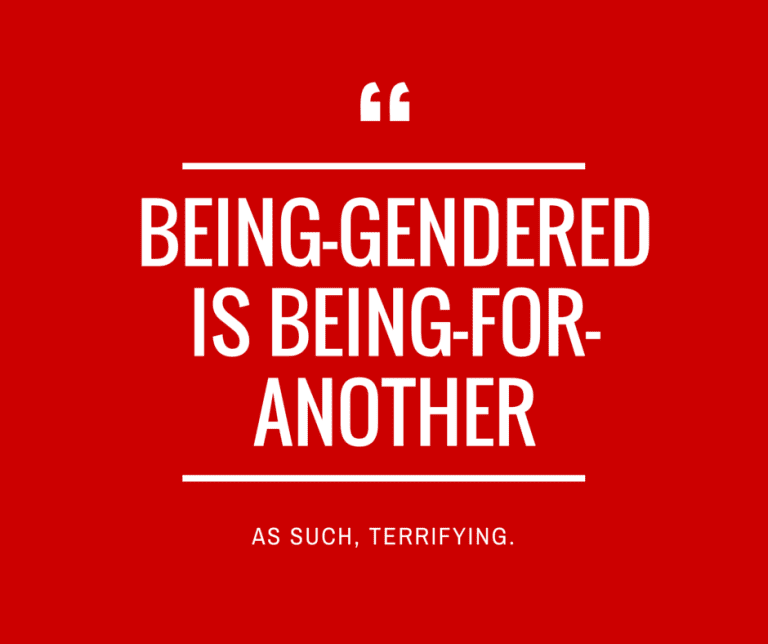
The trans/non-binary movements cannot simply be working for the extension of civil rights. They are not isolated attempts at life-improvement by certain minority groups. Their practical demands are grounded in specific beliefs about gender that either apply to everyone — or fail as grounds. It is a sad sort of “commitment” that takes up the banner of the practical action while remaining too timid to fully live out the theory of gender that makes these actions intelligible and just — to begin to see all bodies as possibly-wrong, all daughters as daughters-for-now.
This non-radical and uncommitted status of the “ally” might seem like a politeness, but it is a politeness that belittles its object. Better yet, it is a politeness that polites its object (from the Latin polire “to polish, to make smooth”) — doing violence to the rough edges of beliefs that would otherwise stick in my feet. My “support” turns these theories of gender into “minority beliefs” that I can walk all over, effectively saying: “I respect such claims, but only insofar as they apply to their oppressed, minority community — not insofar as they disrupt my basic beliefs by making claims to truths that effect me and everyone else.”
I tolerate only by sapping the persons I tolerate of any claim to truth. I respect them as a “community” only by ceasing to let them affect me — that is, by banishing them from my community. They gain the status of minority group only by losing the status of rational persons with some insight into reality that demands my response. My tolerance no longer involves any suffering (from the Latin tolerantia “a bearing, supporting, endurance”) because I have taken the thorns from their arguments and removed them from my community and the community of free, rational beings at large. My tolerance has no tolerantia — but I’ll still pat myself on the back for it.
This is the sadness of an increasingly fragmented liberal society, that, by its doctrine of allowing for “ideas” without any question or concern for truth, it ends in a pretense of community more akin to the insane asylum. Every group in its cell, allowed to rave in varying degrees, just so long as their cries do not cause suffering to the other patients — and a guard clicks down the hall, protecting the right to rave, the right not to be hurt by the raving. No one is united in the truth, and yet we all cry “community!”
This was one of the misread points of the Marxist philosopher Slavoj Zizek’s The Sexual is Political, an essay which lost him the admiration of many transgender readers. In his response to his critics, he argued “not only do I fully support the struggle of transgender people against their legal segregation, but I am also deeply affected by their reports of their suffering, and I see them not as a marginal group, which should be “tolerated” but as a group whose message is radically universal: it concerns us all; it tells the truth about all of us as sexual beings.” But it is precisely this move away from the marginal group and towards the universal message that so intimidates people on either side of the discourse on sex and gender — stay in your cells! Don’t forget that, before all else, you are a modern liberal! Zizek got smeared, not for what he argued, but for refusing the basic doctrine of liberal modernity — to be unaffected by the truth-claims of your neighbors.
To say that “gender is on a spectrum” is a claim that affects every human being. To say that “the gender binary is an oppressive institution of patriarchal thought that exists for the sake of gender hierarchy, excluding and dehumanizing all those who do not fit within its rigid borders” — this is not the “self-experience” of a minority group, but a worldview that encompasses the entire human sphere. I can not grant it for them without radically altering the meaning of gender for me. To make such claims, and then simultaneously back away from it, saying that one merely wants protection for the transgender persons, is either silly, or a calculated method of disseminating the claim without justifying it, forcing it into cultural prominence via the fallacious argument from pity — “do not believe this because it is a universal message, believe it because people will suffer if you do not.”
We need honesty. If “gender is on a spectrum” then everyone’s gender is on a spectrum. If being a man or being a woman is not determined by biological facts, then no man and no woman is justified by their reliance on biology for their gender identity. Cisgendered, polygendered, lesbian or gay — if any believe that they are a woman on the basis of their body, they are unjustified, mistaken, or deluded. If it is wrong to ascribe the term “boy” to anatomically male baby, it wrong for everyone, always. If there is no such thing as “woman,” then a trans woman is wrong to so identify. A feminist is wrong to so identify.
It has always seemed to me that violence springs, not simply from disagreement, but from feigned and strained agreement. I do not wish to hit the person who thinks differently than me. I rather wish to hit the person who will not admit that we think differently. I do not boil over a debatable philosophy. I boil when a debatable philosophy becomes dogma, embracing me without first displaying its embrace of the truth. It is not an unquestioned, unlived, and unthought alliance with the unproven premise of the “innermost concept” that will bring peace and justice to an aching, gender-troubled world. Such a flattening of debate will simply encourage the violence that inevitably springs between people who must pretend to be united, pretend to be in community, but are really without love, without common ground, and without discourse.











